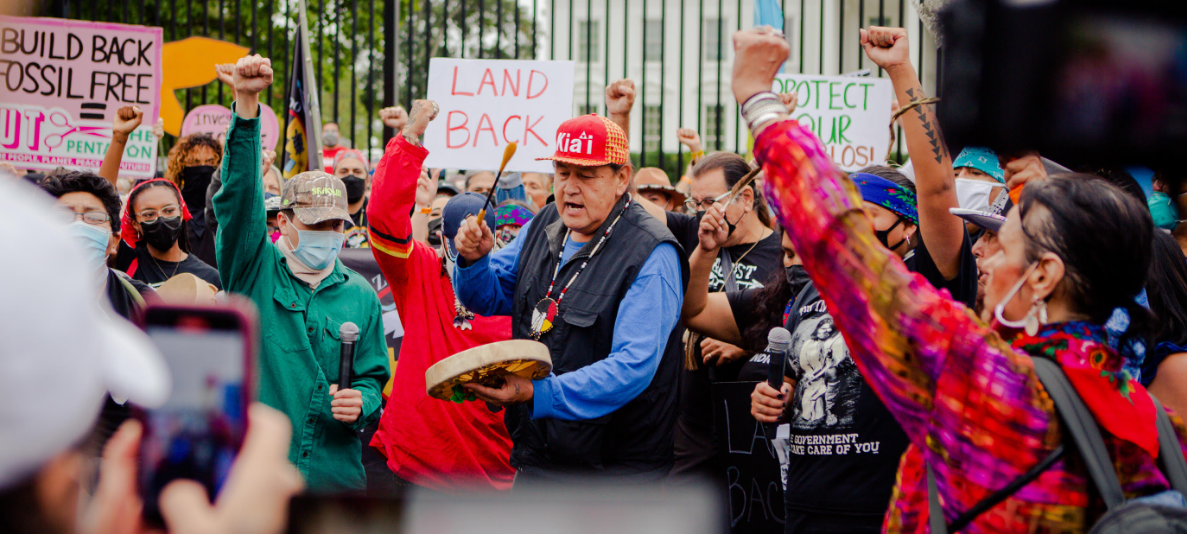
- Details
- By Darren Thompson
Yesterday, more than 130 people were arrested for protesting outside the White House, beginning a week-long demonstration demanding that President Biden declare a climate emergency and stop all new fossil fuel projects. People vs. Fossil Fuels convenes this week in what organizers say is the largest civil disobedience action in decades.
“We are going to put our bodies on the line there. If we have to be arrested in order to call attention to what the crisis is and that we need a climate emergency declared, we’ll do that,” said Casey Camp Horinek, in a statement a tribal elder and environmental ambassador for Ponca Nation, who was one of those arrested at the White House yesterday. “There’s been 500 years of people coming into a territory where all things were interdependent and functioning to a time of crisis, where even Biden’s great-grandchildren won’t survive if something doesn’t change.”
Want more Native News? Get the free daily newsletter today.
The week-long event is led by Indigenous water protectors, activists, and Tribal leaders from across the country. Organizers demand that President Biden stop approving fossil fuel projects and declare a climate emergency ahead of the United Nations climate summit in November.
Indigenous peoples and lands are often at the helm of the oil and gas industry. Oil and gas development on Indian trust lands frequently begin before required permits or agency approvals have been obtained, which increases exposure to toxic pollutants, which is directly associated with many acute and chronic health risks in Indigenous populations.
According to the Associated Press, the Biden administration has already approved more oil and gas development on federal and tribal lands than any president since George W. Bush, despite campaigning that he would not increase drilling. A study by the George W. Bush Institute demonstrates Indian reservations contain almost 30 percent of the nation’s coal reserves west of the Mississippi, 50 percent of potential uranium reserves, and 20 percent of known oil and gas reserves — resources worth nearly $1.5 trillion, or $1.5 million per tribal member.
Major pipeline projects and other forms of oil and gas extraction not only threaten the land and water in Native communities, but are often in direct violation of treaty rights or violate laws. Natural resource extraction has also been linked to sex trafficking and an increase in Missing and Murdered Indigenous Women.
Today, demonstrators marched to the front of the White House to continue civil disobedience. After the demonstration at the White House, Water Protectors from Line 3 marched to the Army Corps of Engineers Headquarters and delivered a petition addressed to Acting Army Corps Assistant Secretary Jaime Pinkham and President Biden demanding that the Line 3 pipeline must be stopped for a more thorough environmental impact statement. The petition has more than 1,000,000 signatures to stop Line 3.
“We’re demanding President Biden use his executive authority to hasten the end of the era of fossil fuels,” said organizers on its website,peoplevsfossilfuels.org. “We are putting our bodies on the line to ensure President Biden passes this crucial test.”
More Stories Like This
Trump signs law that revokes some limits on drilling in Alaska’s National Petroleum ReserveSouthern Sierra Miwuk Nation Gets 900-Acres ofLand Back
Chilkat Indian Village Tells New Palmer Mine Owners They Are “Not Welcome” in Chilkat Valley
Tribes, Coastal Group Ask Army Corps to Revoke Permit for Texas Export Terminal
Michigan Tribes Tell Supreme Court: Don’t Bail Out Enbridge
Help us defend tribal sovereignty.
At Native News Online, our mission is rooted in telling the stories that strengthen sovereignty and uplift Indigenous voices — not just at year’s end, but every single day.
Because of your generosity last year, we were able to keep our reporters on the ground in tribal communities, at national gatherings and in the halls of Congress — covering the issues that matter most to Indian Country: sovereignty, culture, education, health and economic opportunity.
That support sustained us through a tough year in 2025. Now, as we look to the year ahead, we need your help right now to ensure warrior journalism remains strong — reporting that defends tribal sovereignty, amplifies Native truth, and holds power accountable.
 The stakes couldn't be higher. Your support keeps Native voices heard, Native stories told and Native sovereignty defended.
The stakes couldn't be higher. Your support keeps Native voices heard, Native stories told and Native sovereignty defended.
Stand with Warrior Journalism today.
Levi Rickert (Potawatomi), Editor & Publisher
